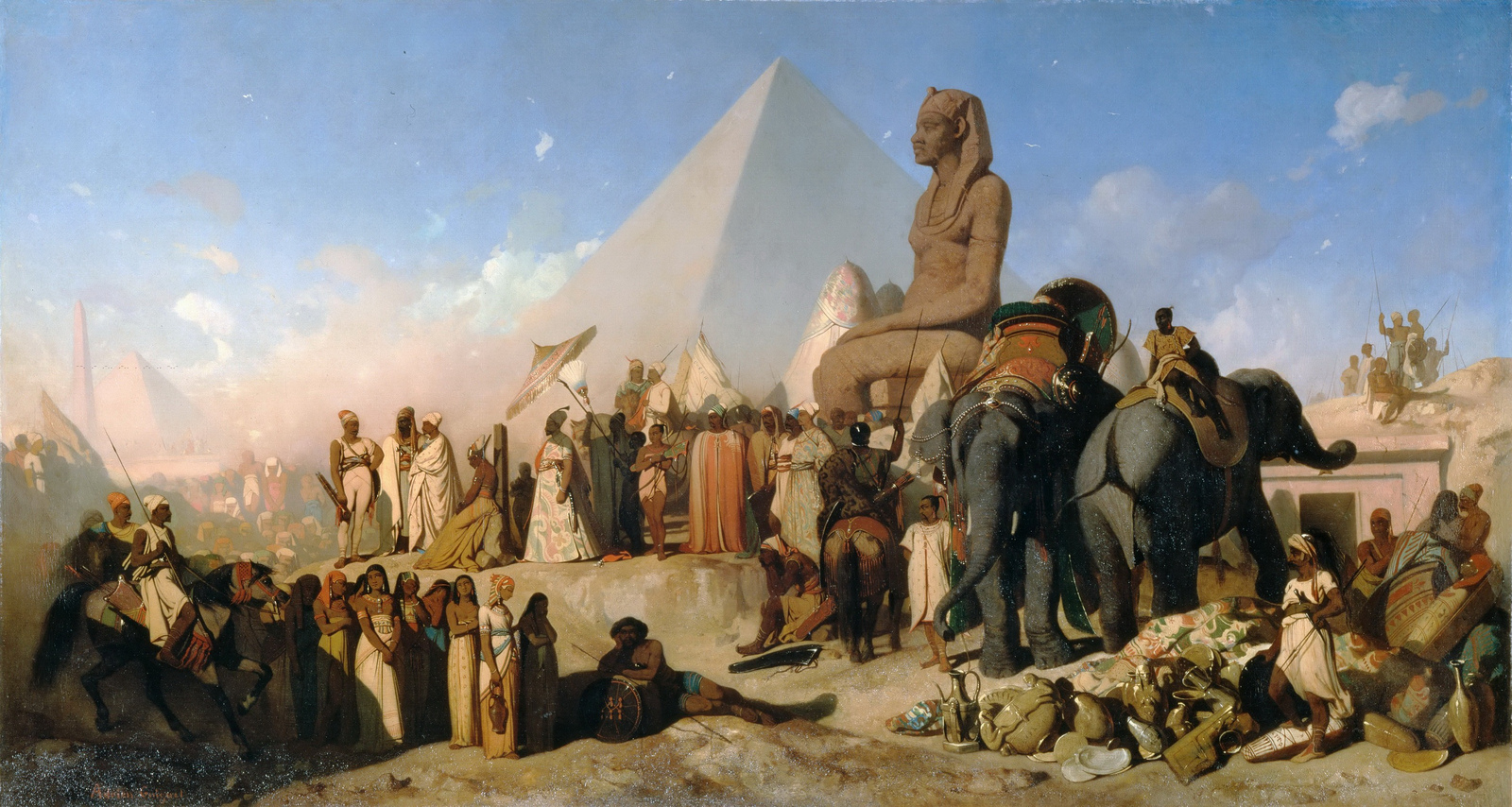….
As every serious Bible student knows, the activities of the Egyptian and the Israelite people come together several times in ancient history. From the time of Abraham through the period of the exodus, there was considerable familiarity between Egypt and the Hebrews. Consider the following examples which provide a sense of integrity to the Jewish Scriptures:
The common title of the Egyptian rulers was “Pharaoh” (Genesis 39:1; Exodus 5:1), meaning “the great house.” Herodotus mentions an Egyptian ruler called “Pheron” (ii.111), a name or title strikingly similar to the foregoing. In Genesis, the Pharaoh is represented as having great authority (40:3, 21-22; 41:34, 41-44). Similarly the Greek historian describes the supreme control of the Egyptian rulers who could arbitrarily make laws (ii.136, 177).
One recalls the lewdness of Potiphar’s wife who, though married, continuously sought to seduce the young Joseph (Genesis 39:7-10). Herodotus tells of an Egyptian ruler who, for the sake of performing an experiment, searched “at length” for a married woman “who had been faithful to her husband” (ii.111).
Pharaoh’s chief butler, with whom Joseph was imprisoned, dreamed of returning to his position and of squeezing ripe grapes into the king’s cup (Genesis 40:10-11). Some critics cite this as a biblical mistake, asserting that Herodotus declares that the Egyptians grew no vines (ii.77). However, the historian may have been alluding only to certain regions of Egypt, since elsewhere he specifically mentions the priests as drinking “wine made from the grape” (ii.37).
In the dream of the chief baker, the baker saw himself carrying baskets of bread upon his head (Genesis 40:16). Herodotus mentions that whereas the Egyptian women transported burdens upon their shoulders, the men carried them upon their heads (ii.35). This is the very opposite of the custom in many countries.
When Joseph received his estranged brothers into his house, they were given water with which to wash their feet (Genesis 43:24). There is the record of an Egyptian ruler who had a golden foot-pan “in which his guests” were provided water to wash their feet (ii.172).
The Mosaic narrative records that when Joseph’s brothers returned from Canaan with Benjamin, the ruling prince commanded his servants to slay animals and prepare a noon-time feast for his visiting kinsmen (Genesis 43:16). While some have contended that the Egyptians, due to their worship of animals, did not eat flesh, the evidence does not warrant that conclusion. Herodotus notes of certain priests: “[E]very day bread is baked for them of the sacred corn, and a plentiful supply of beef and of goose’s flesh is assigned to each” (ii.37). Elsewhere he describes how a sacrificial “steer” is prepared for ceremonial feasting (ii.40).
The Genesis account states that the Egyptians would not eat bread with the Hebrews, for such a practice was an abomination from their religious viewpoint (43:32). The Egyptians considered all foreigners unclean. Concerning the Greeks, the “father of history” writes: “[N]o native of Egypt, whether man or woman, will give a Greek a kiss, or use the knife of a Greek, or his spit, or his cauldron, or taste the flesh of an ox, known to be pure, if it has been cut with a Greek knife” (ii.41).
The medical profession in Egypt was highly advanced. Herodotus observed that medicine was specialized so that “each physician treats a single disorder” (ii.84). Jeremiah once chastised: “O virgin daughter of Egypt: in vain dost thou use many medicines; there is no healing for thee” (46:11).
When Jacob died, “physicians” were commanded by Joseph to embalm the patriarch (Genesis 50:2). The Greek historian gives an elaborate description of the embalming process which commenced with the removal of most of the brain with an iron hook through the nostrils, the balance being flushed out with drugs. The body cavity was filled “with the purest bruised myrrh, with cassia, and every other sort of spicery” (ii.86). One cannot but be reminded of that Ishmaelite caravan to which Joseph was sold. Headed down into Egypt, it was bearing “spicery and balm and myrrh” (Genesis 37:25; cf. John 19:39). The body was then put into a “wooden case” which had been “carved into the figure of a man.” Joseph’s body was placed in a coffin when he expired (Genesis 50:26). When Jacob died, “the Egyptians wept for him seventy days” (50:3). Herodotus describes how Egyptian men and women, during the mourning period, would wander the streets, beating their breasts (ii.85).
After Joseph died, a new king arose in Egypt who was not so favorably disposed toward the Hebrew people. The Israelites became slaves in a distant land. “Taskmasters” were set over them and they were employed in the manufacture of bricks made of mud (Exodus 1:14). Though stone was a ready building material in Egypt, Herodotus speaks of bricks made of mud (ii.136). These were used in ordinary dwelling houses, tombs, walls, etc. The bricks were made of river mud and straw, shaped in wooden molds and left to dry in the sun. The chemical decay of the straw within the clay formed an acid which gave the clay greater plasticity for brick-making. Remember that when the Israelites’ labor was intensified, they were forced to provide their own straw (Exodus 5:10-13). In the Oriental Institute in Chicago, there is a dried mud brick with protruding fragments of straw, stamped with the Cartouche (oval figure) of Rameses II.
When Moses was a baby, his mother hid him for three months, fearing the wrath of the Pharaoh. When she could conceal the child no longer, she made a small boat of bulrushes, i.e., the papyrus plant, and placed it at the edge of the Nile river (Exodus 2:3). The use of papyrus in making boats was distinctly Egyptian and not in vogue elsewhere. Herodotus mentions the use of papyrus in caulking Egyptian boats and in the manufacture of sails (ii.96).
….

No comments:
Post a Comment